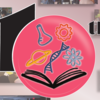by Daniela Capello (ComSciCon-GTA 2020)
It’s that time of year again. You and your loved ones gather around the table for a holiday meal and you know it’s coming. You’ve prepared your answers for questions like “so, anyone special you want to tell us about?” and “how many more years are you going to be in school for? When will you get a job?” but there is always that one question that leaves you stumped. So what do you really do?” After all, you talk about the intricacies of your project almost daily with your coworkers, your PI, friends in your department and on academic Twitter.
I’m a chemist. I often get so caught up in my project details that I forget the big picture. Why am I doing this research? How will this impact people in everyday life? The work we do contributes to a greater picture of research - ultimately allowing us to impact our fields in various ways. Being able to explain my research to non-experts is a task in itself. This doesn’t come easy to many people, and it certainly did not come easy to me at first. I tried explaining what I do (in great detail, I might add) to my brother. I’m certain by how he looked at me that it sounded like complete gibberish to him, a computer science major. Kidding aside, here are some tips and tricks I found to be effective when explaining what it is I really do to my friends and family when they ask.
To a chemist: I synthesize redox-active molecular and polymeric dyes as a class of new materials for uses in cell imaging, fluorescent sensors and OLEDs.
Tip #1: Relate it to something they know about
This is arguably the most important aspect to consider when discussing your work. If you take anything away from reading this, it should be this point. UNDERLINE. BOLD. Everybody is different and has different life experiences, and it's no secret that most people learn best by doing. People will often remember an experience, rather than something they were told that is totally unrelated to their life. Now, I’m not saying bring samples of mouse brains and a microscope from the lab home to your parents' place. I’m merely suggesting that you consider how their life experience may relate to what it is you study. There is no way I’d start drawing molecular orbital diagrams for my 82-year-old Italian grandmother. Instead, I consider something she’s experienced recently that I can use as a connection for her between my research and her level of understanding.
To my grandmother: Remember that test you had where they injected you with something to make your blood vessels glow? I make new liquids that glow too.
Tip #2: Know the impact of your work
As academics, we often focus on the small details of our project. How much of this should I add to that to get a chemical reaction to work? What if I add more data points? Should I test another substrate? But the fact of the matter is that nobody, other than you and your PI, really care. It’s difficult to get into the nitty gritty details of your research program without understanding the big picture. When you can take a step back and remind yourself what you’re working towards, it's easier to consider a general application of your work and get your audience as excited about what you do as you are!
To my tech-savvy friend: I make molecules that glow and conduct electricity, like the ones they put into the screen of your new iPhone and other electronic displays.
Tip #3: Simplify it just enough
I’m sure you’ve heard the stereotype that “academics are snobby know-it-all’s.” Try to rid yourself of that stereotype by using appropriate language and terminology. This point ties in directly with tips 1 and 2 listed above. By relating it to something they have life experience with and remembering the general impact of your work, you can meet on the same page and have a discussion about your research, rather than a lecture-style explanation.
To the elementary-school age kids I used to babysit: I make new things that glow in the dark- like the golf balls at mini golf and those star stickers on your wall.
I didn’t realize this before, but effective science communication to non-experts is an important skill that must be acquired by all scientists. As academics, it is our responsibility to be effective communicators. It is not always as easy as sending the link to your latest publication to someone who asks, unless of course, they’re an expert in the field themselves. Heck, there are times I read chemistry papers outside my own specific discipline and it feels as though I’m reading another language (thank you Google and Wikipedia!). This is why it's so important to break that cycle and be able to discuss our research in a non-academic setting. With these tools and tips in mind, I hope you feel better prepared for your next family function, where you’ll no longer panic when you are asked the words by your favourite cousin – So, what do you really do?
----------------------------------------------
![]() Daniela was born in Toronto and raised just north of the city in Vaughan. She completed her BSc with an honours specialization in Chemistry at Western University in April 2017. Daniela began her graduate studies in September 2017 under the supervision of Prof. Joe Gilroy, where is currently an NSERC-CGSD funded graduate student. Her research focuses on the synthesis and characterization of redox-active emissive dyes. Daniela is passionate about science communication and teaching both in and out of the lab. She is actively engaging with the chemistry and science communities on Twitter (@danielacappello) and is often sharing #FluorescenceFriday content of her highly coloured and fluorescent materials. In her free time, Daniela enjoys cooking, yoga, being outdoors and being a cat-mom to her rescue creamsicle, Charlie.
Daniela was born in Toronto and raised just north of the city in Vaughan. She completed her BSc with an honours specialization in Chemistry at Western University in April 2017. Daniela began her graduate studies in September 2017 under the supervision of Prof. Joe Gilroy, where is currently an NSERC-CGSD funded graduate student. Her research focuses on the synthesis and characterization of redox-active emissive dyes. Daniela is passionate about science communication and teaching both in and out of the lab. She is actively engaging with the chemistry and science communities on Twitter (@danielacappello) and is often sharing #FluorescenceFriday content of her highly coloured and fluorescent materials. In her free time, Daniela enjoys cooking, yoga, being outdoors and being a cat-mom to her rescue creamsicle, Charlie.





